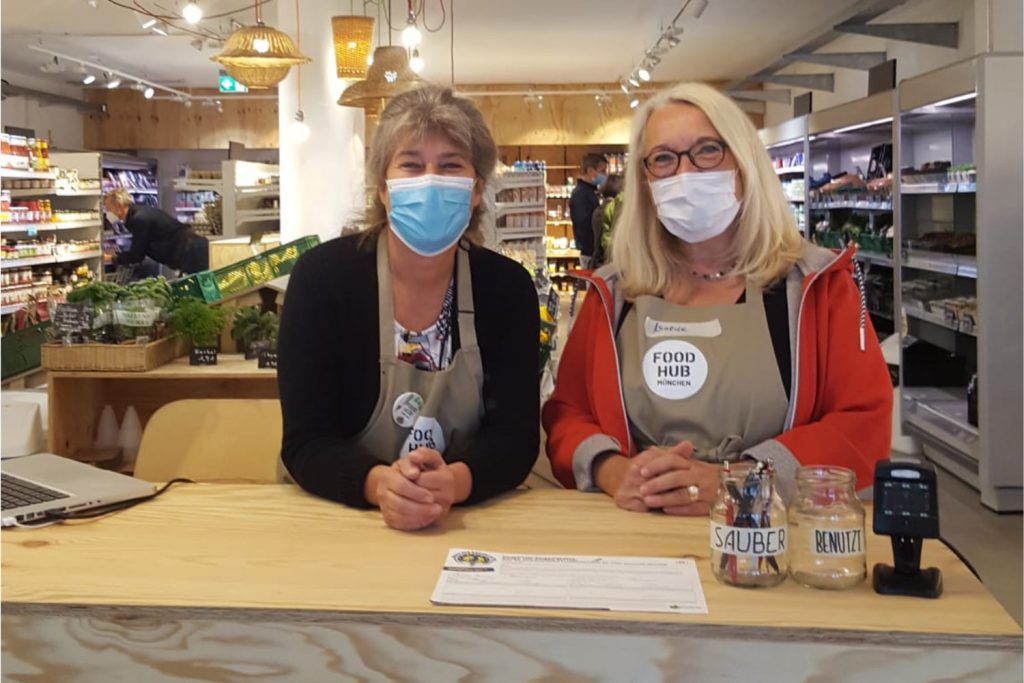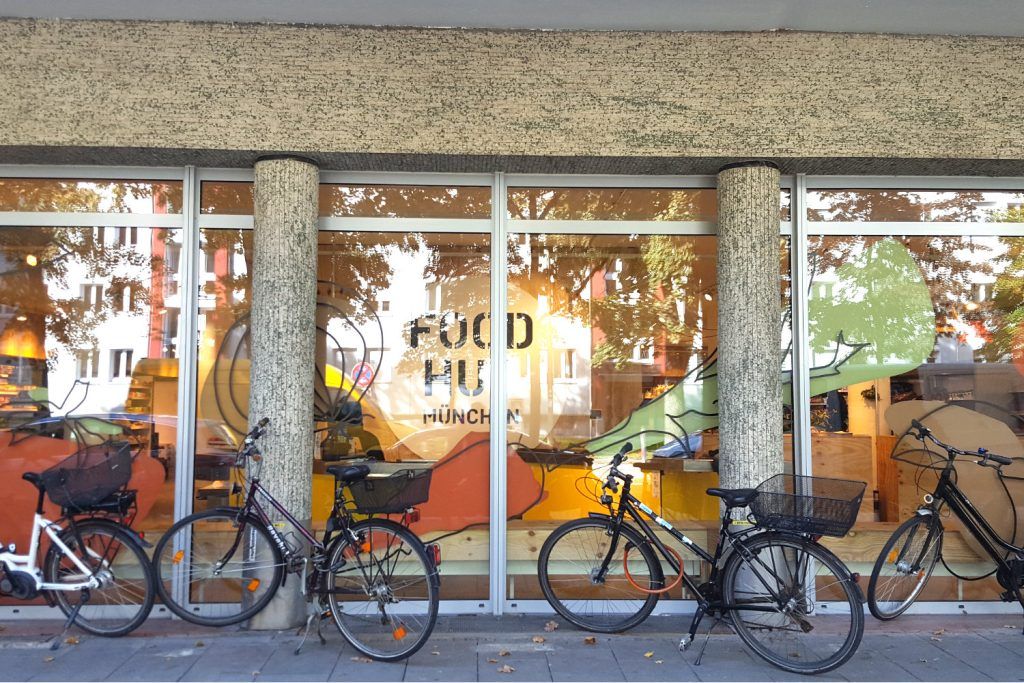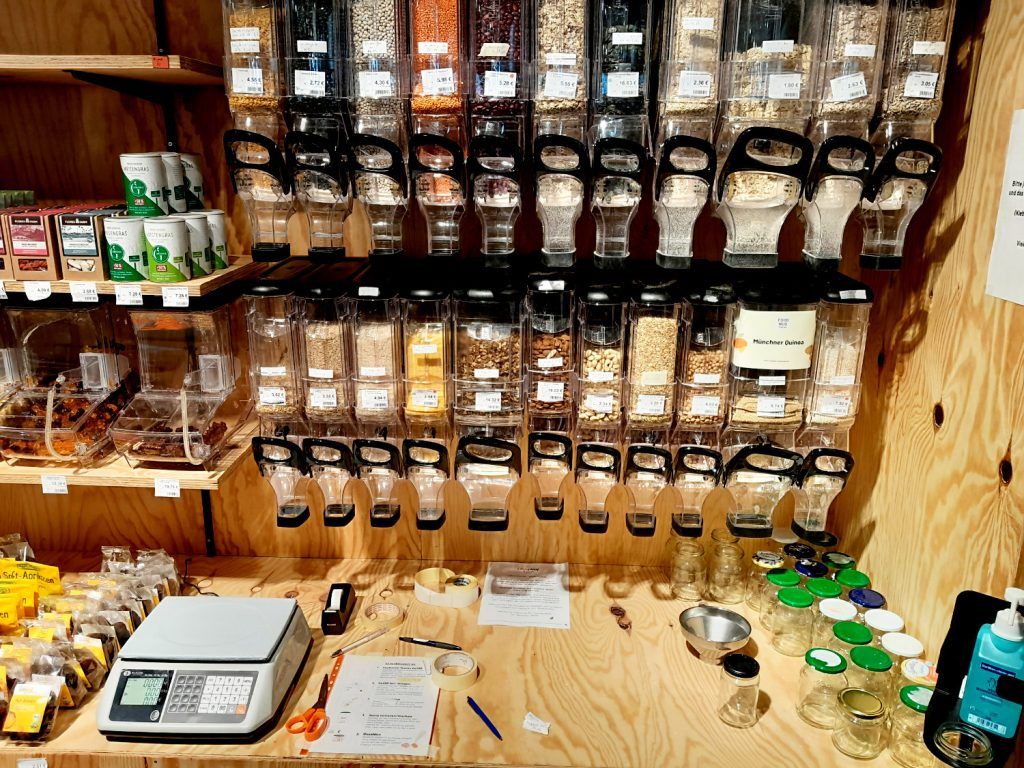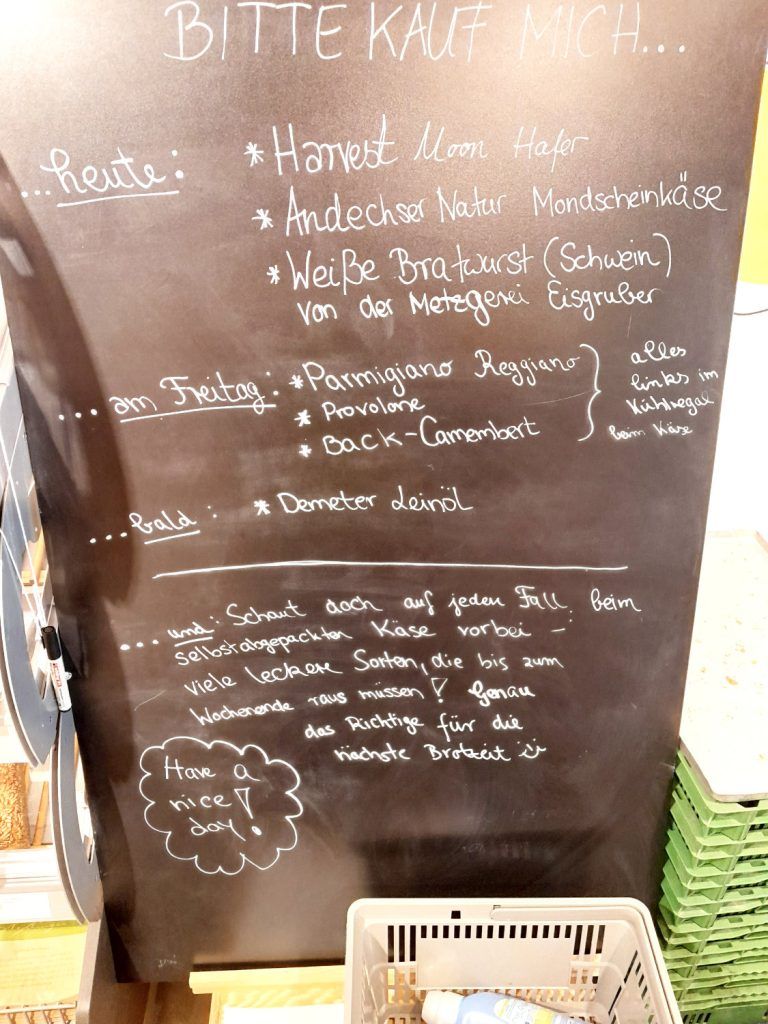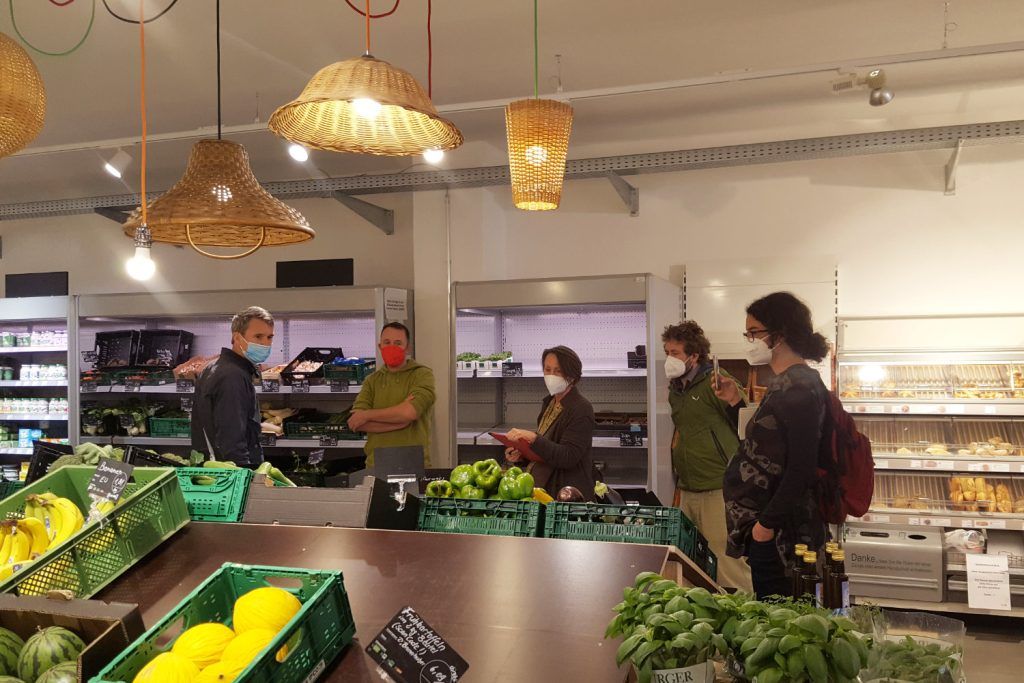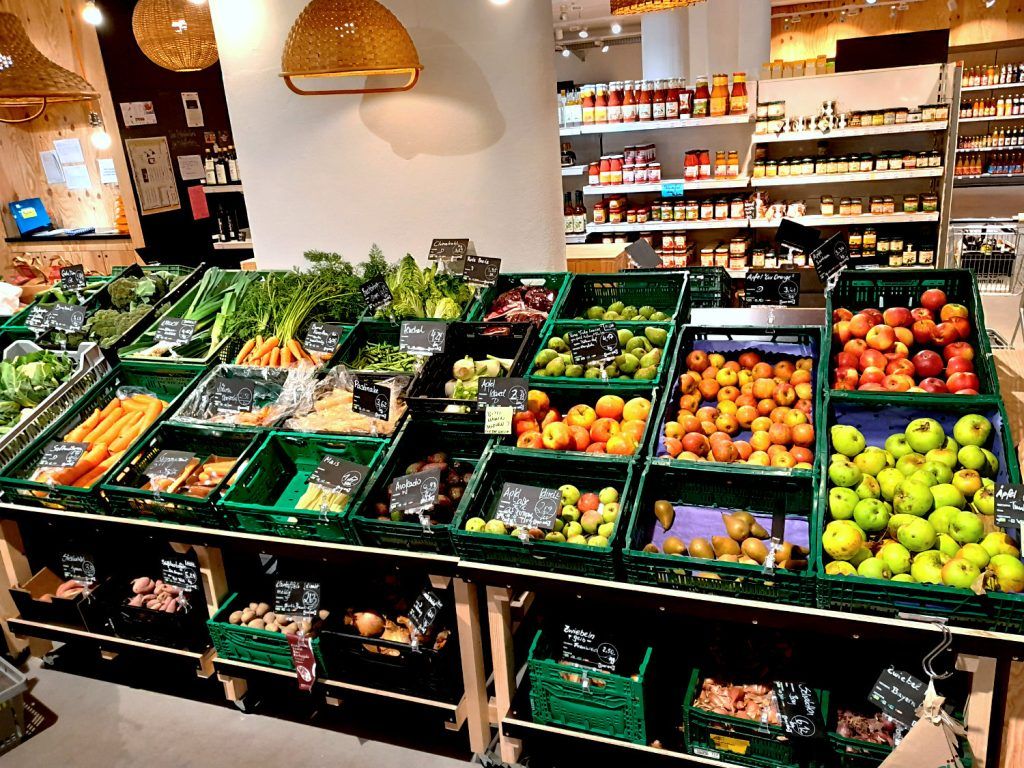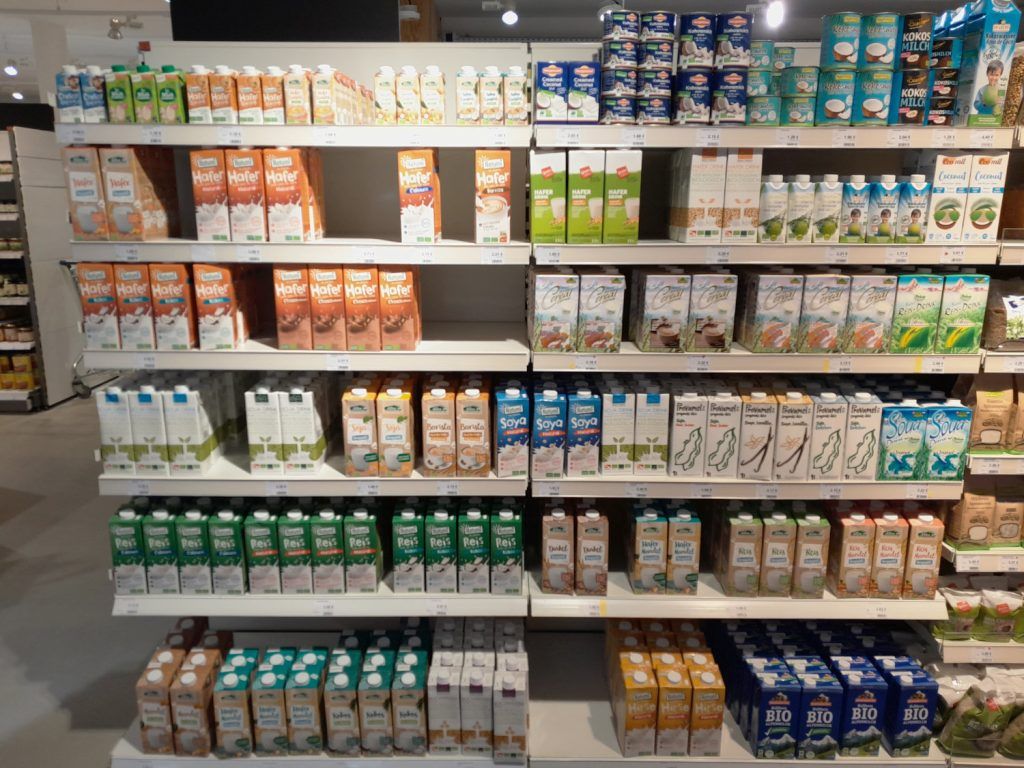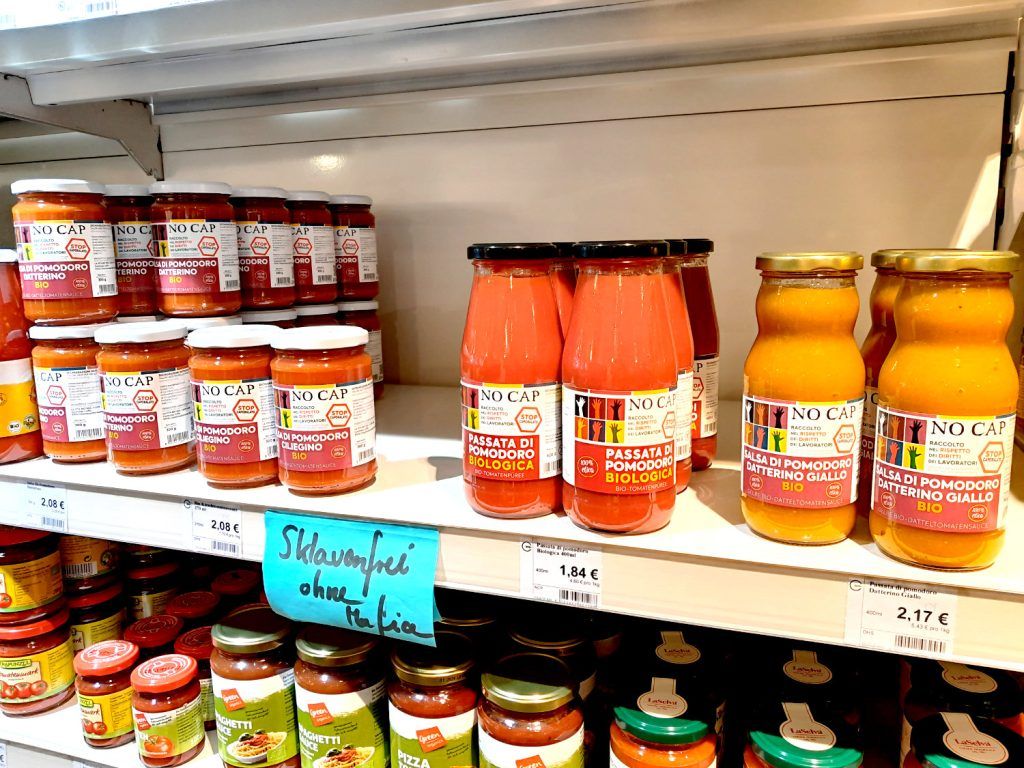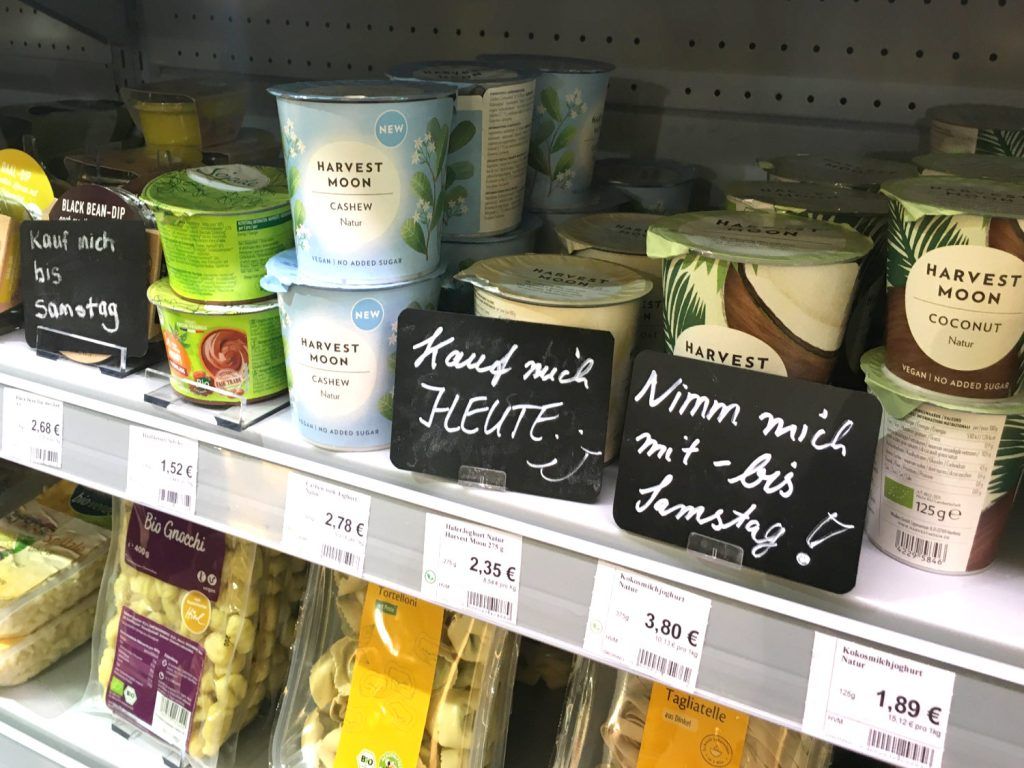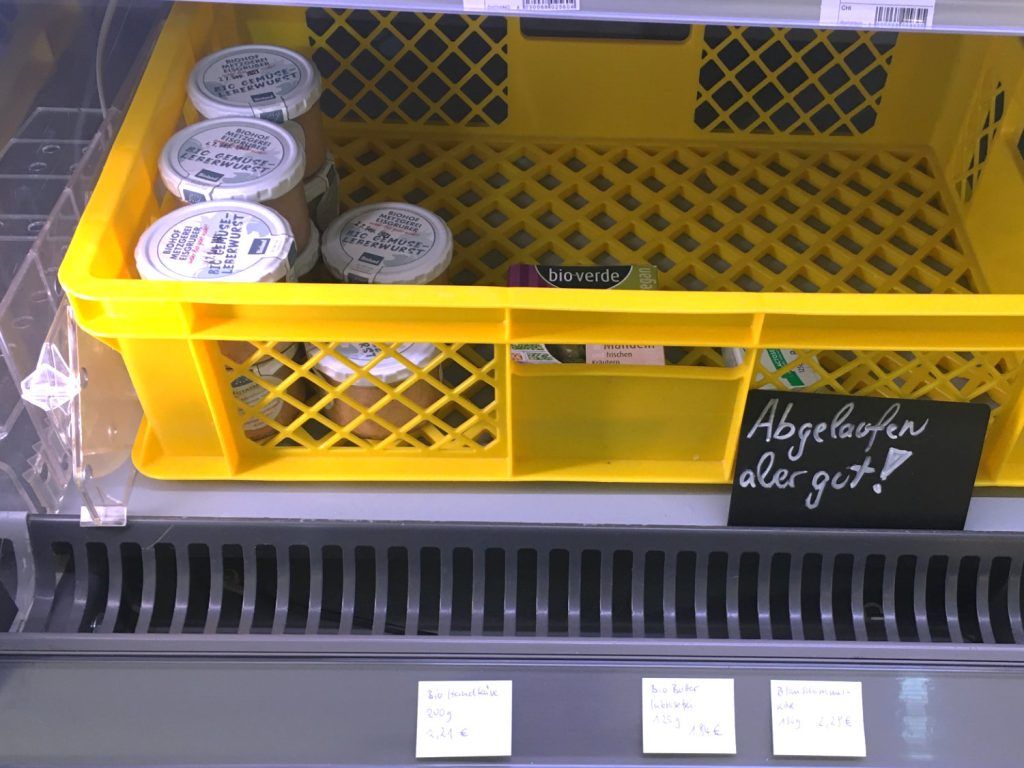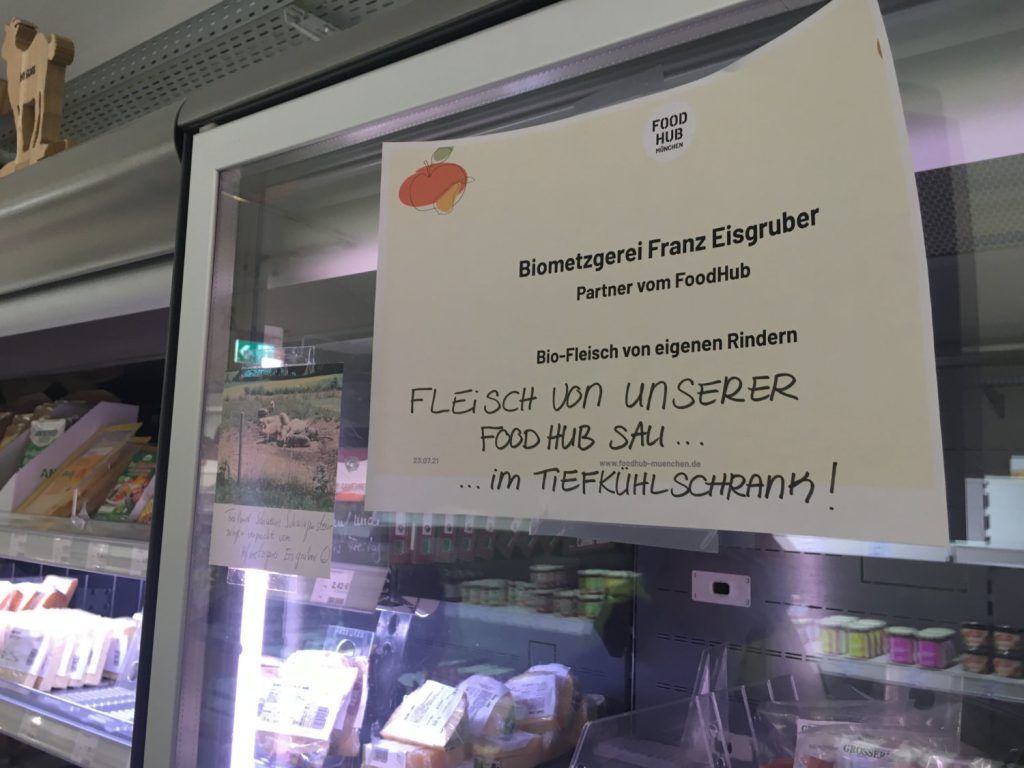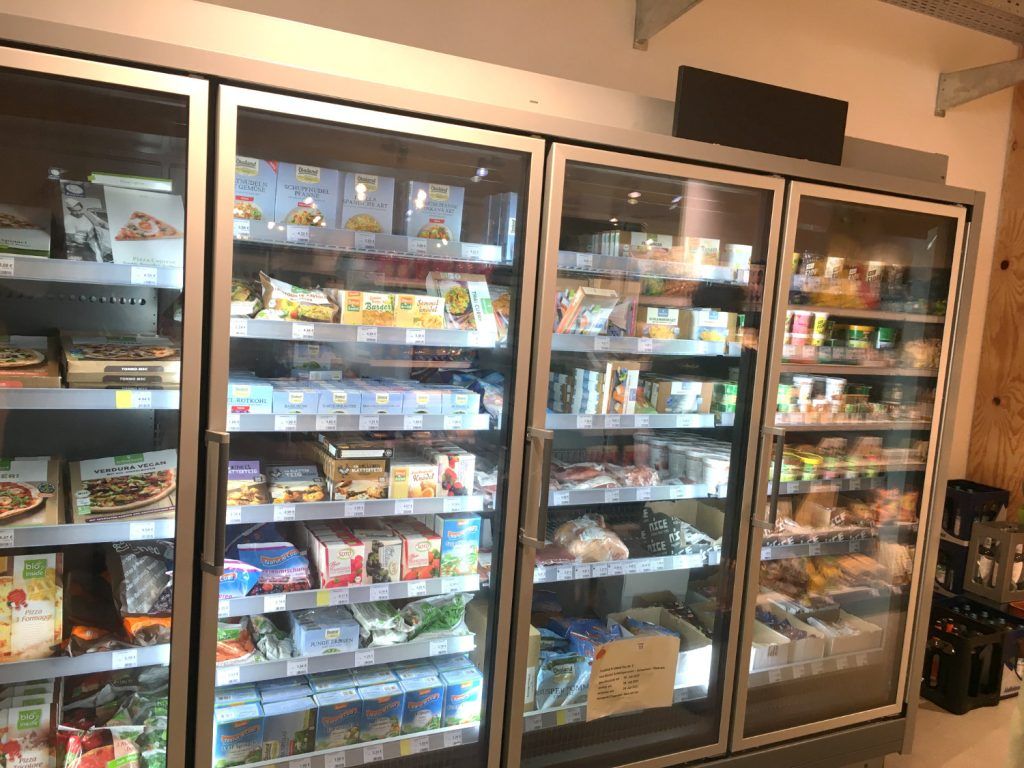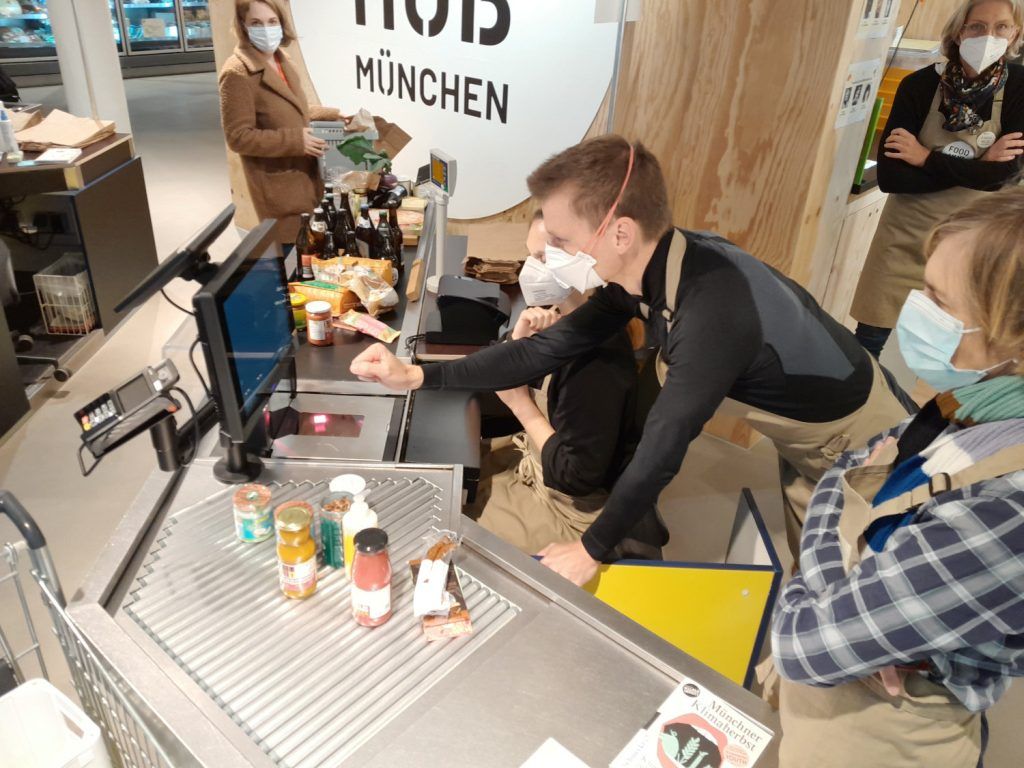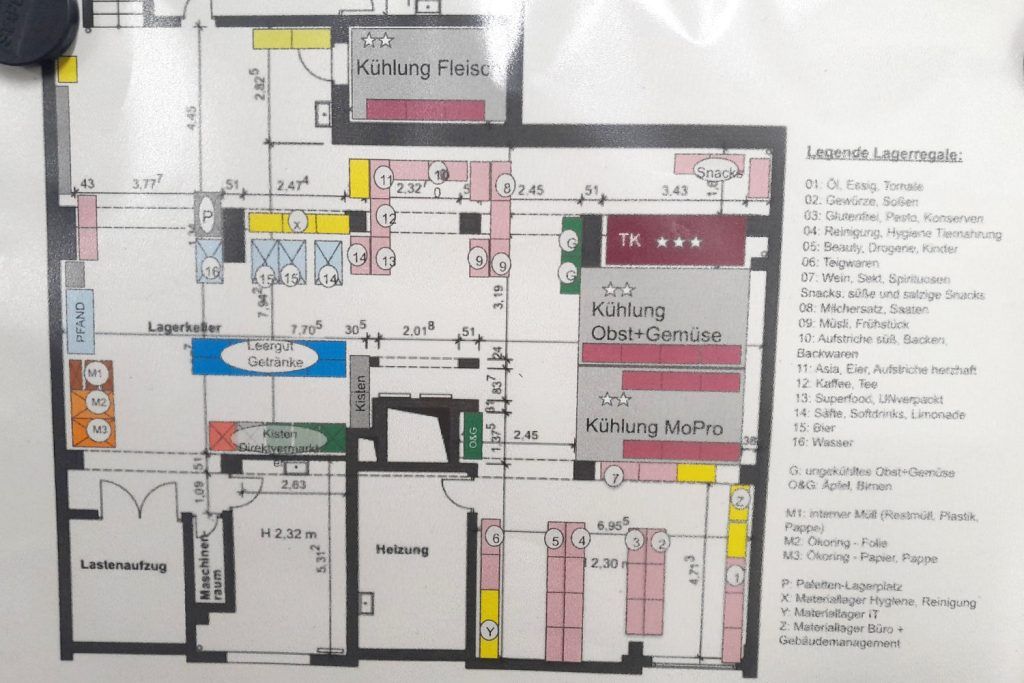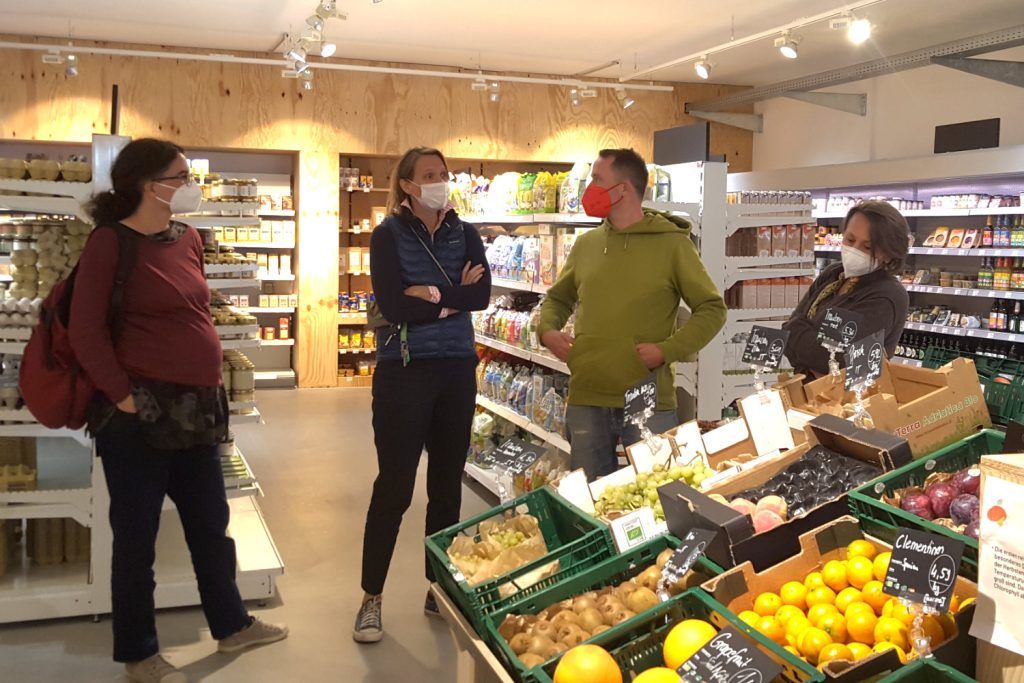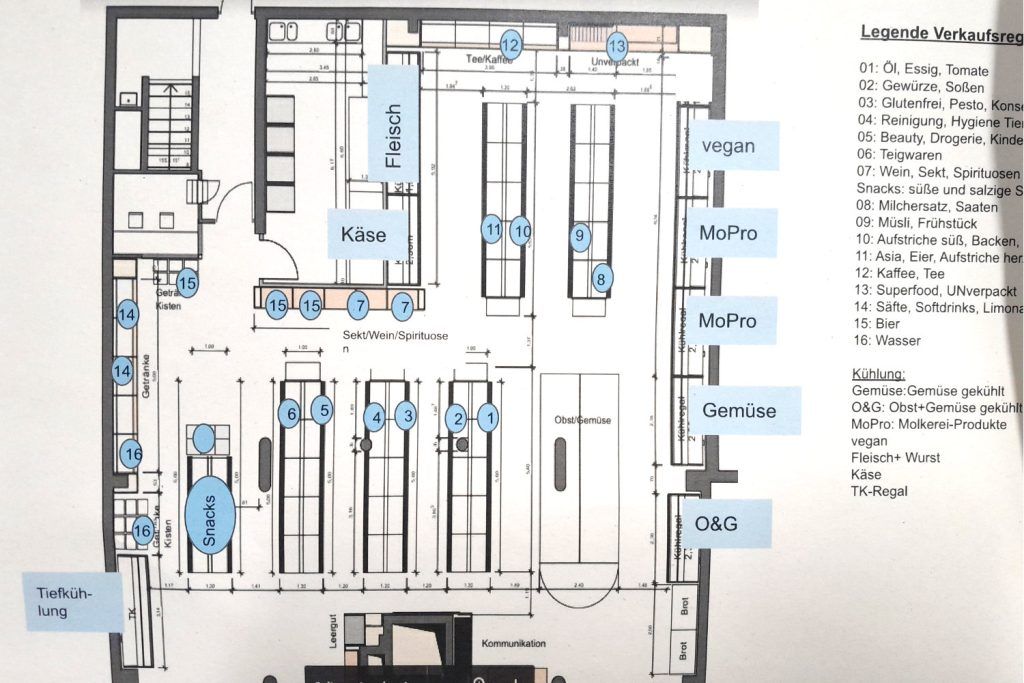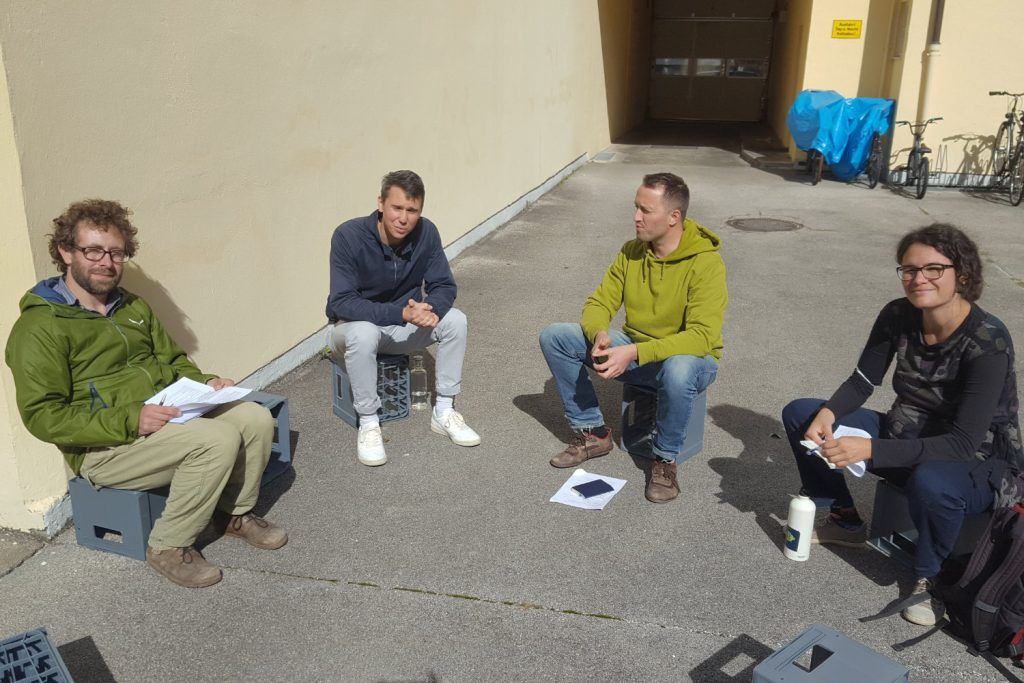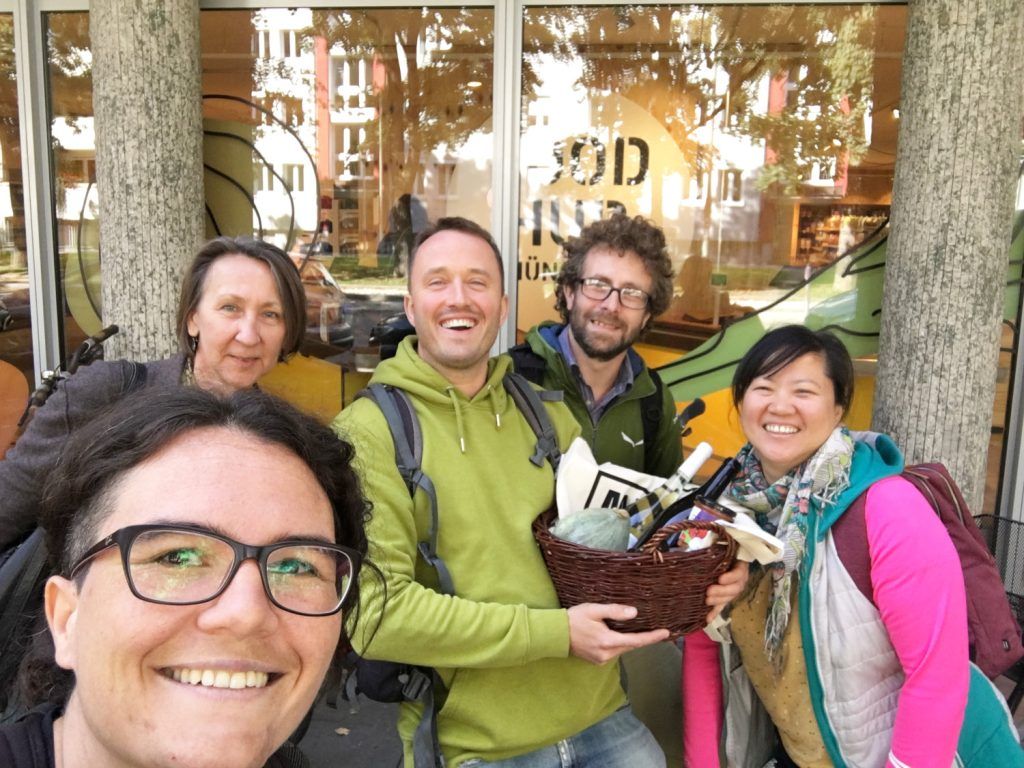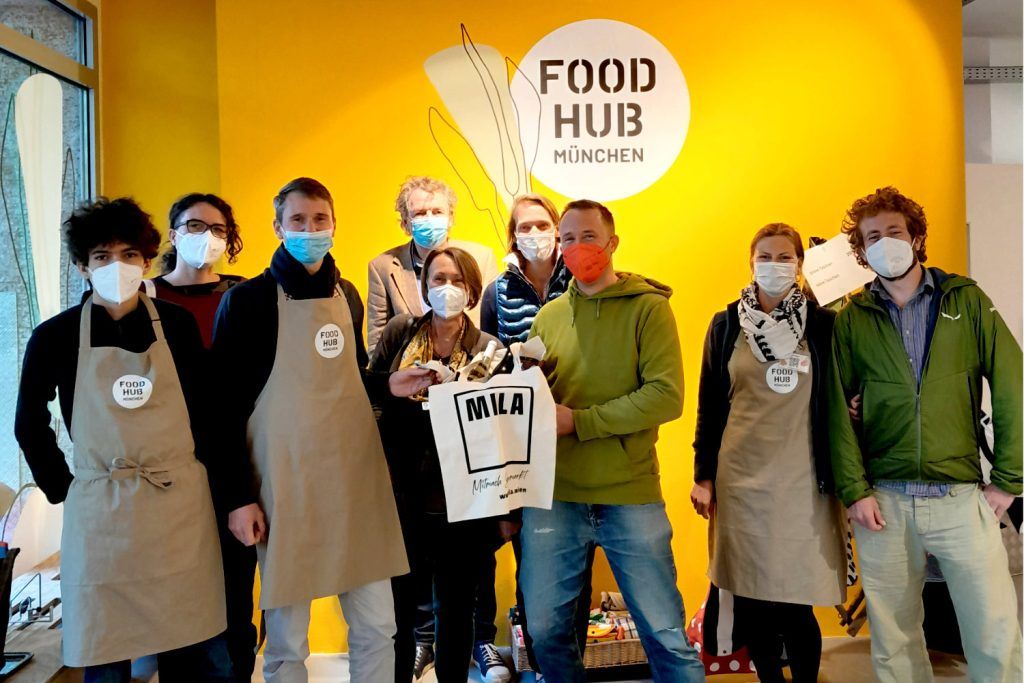In the tranquil Munich Obergiesing, the FoodHub Munich opened its doors at the beginning of July 2021, the first participatory supermarket in Germany. A small MILA delegation was on site at the end of September to get a picture of the ongoing operations and to take away suggestions and ideas for our own supermarket.
We arrive at noon on a Thursday in autumn, the atmosphere in the store is calm. Right at the entrance after the sliding doors is a wide wooden counter: we are greeted friendly with a smile and “You’re the ones from Vienna, right?!“.
There is not much going on in the store itself right now, everything still feels very new and a little sterile. Freshly painted walls in orange, stylish shelves, full fruit and vegetable crates: There is not yet much of the hustle and bustle that we would like to see in our MILA participatory supermarket.
We meet Kristin Mansmann and Quentin Orain, both founders and both members of the board: Quentin is also responsible for parts of the assortment. Kristin’s tasks are accounting and other operational activities. After a first short acquaintance we get a small tour through the store.
Landlady supports
The FoodHub has an extremely favorable rent for Munich: They pay eight euros net for the square meter – the landlady is very well-meaning to them.
The FoodHub moved into an abandoned Plus store – but they had to renovate and refit it from the ground up. GLS Bank provided a loan of half a million euros for this purpose; in addition, cooperative shares are constantly coming in and also some via loans from the members.
With approximately 200 meters to the Untersbergstraße subway station, the FoodHub is ideally connected to the public transportation system. Obergiesing has about 9,400 inhabitants per square kilometer and is the 17th district of the Bavarian capital. To the north, it borders on the 5th district of Au-Haidhausen, which is directly adjacent to Munich’s city center.
The neighbourhood is not extremely frequented, but in a good location – it is already busy with many stores. The ambience directly in front of the FoodHub was pleasant without much car traffic, although it is easily accessible by car.
Growing is the top priority
At FoodHub, there are currently no mandatory info sessions before members are accepted. They want to keep the hurdle as low as possible so they can grow quickly. Any new member can just drop in – even without an appointment – and take on a shift right away. For the work that needs to be done, there are lists that help orient. People help each other. The lack of information sometimes leads to misunderstandings, but this hardly causes any problems.
Fast growth is a priority at the FoodHub! We learn here that many paths can lead to the goal.
“It runs.“
that is how simple it sounds coming from Quentin.
The FoodHub makes around 70,000 euros a month with just under 1,000 members – as of the end of September 2021. The goal is to increase turnover by 10,000 to 15,000 euros a month. At the moment, many people become members, but do not come shopping yet.
Products & assortment
The assortment of the FoodHub Munich consists of 100 per cent organic goods! The product range is solid, from nappies to fresh meat, there is a wide selection.
They have a lot of trade goods, but far fewer products from direct suppliers than expected. The assortment is constantly being expanded and adapted, as they only see what works well and what does not work so well when the goods reach their best before date.
They have chosen the right strategy for this: With rolling offers, i.e. new products, they want to find out what the members want. In the FoodHub, there is a »wish book« in which members can wish for individual items or brands.
Very beautiful wooden shelves present the wine and beer assortment. Beer – this is Munich after all – is staged as a “culturally relevant product“.
Quality & Price
The FoodHub has a great cheese offer! They buy a lot through Jürgen Würth, a renowned organic and delicatessen wholesaler. The cheese is bought whole, i.e. in bulk, and cut up by the members at the FoodHub – there is a specially equipped processing room for this. There are separate shifts for this, where the cheese is cut and packed in household quantities. The cheese is 20 to 25 per cent cheaper as a result. Quentin is in charge of buying cheese and shows us with some pride the low prices for some French cheese specialities.
The large open vegetable department looks very inviting. However, the vegetable and fruit assortment is still challenging at present. At the moment, much of what they buy from the trade is not of satisfactory quality. They are still in the process of finding good suppliers.
For meat, they are already working with a local producer: Here they receive a whole pig, already cut up and vacuum-packed.
The Executive Board
Quick implementation is more important to them than flawless processes: The founders and board members Kristin Mansmann, Quentin Orain and Karl Schweisfurth are very committed. Kristin comes from the start-up industry and brings this “drive“ with her. Karl himself comes from the food industry and is very well connected. So the noticeable start-up mentality is not surprising.
“We guarantee the protection of economic interests!“
is the attitude of the board team.
As a board team, the three of them have a lot of decision-making power and thus they have been able to move the construction forward quickly – the community still has to “catch up“. Nevertheless, they combine the two important elements and put them at the centre: maintaining the momentum and keeping the members interested.
Shifts & Software
The FoodHub works with the enterprise resource planning software “Bio Office“, which is a common software, but not an open source solution.
All members work for three hours every four weeks. They can arrange their shifts themselves in the shift management system, where they always have an overview and can also easily swap.
There are seven members on the early shift, five on the evening shift and five during the day. For a missed shift, the members have to do two shifts. If they swap shifts, they have four weeks to make up the shifts.
They bought the software that FoodHub uses to manage the shifts from Coop IT easy – a Brussels-based software cooperative that also works with BEES Coop Supermarket in Brussels. Their first experiences with it seem to be positive throughout, even though Quentin says that they have learned to live with some “bugs“ as the support hours are very expensive.
No social security and pension
The collaborating members are neither employees nor freelancers and therefore do not have to pay pension and social insurance – a decision issued by SuperCoop in Berlin has clarified this, and the FoodHub in Munich relies on this decision.
Relaxed atmosphere
Dynamic and relaxed are not mutually exclusive here. People take each other by the hand, it is stress-free. And, the cooperative idea of supporting each other is strongly present.
In general, the FoodHub is bright, friendly, cosy – not least because of the nice personal welcome. Everything is spacious and nothing is too cluttered with goods. Nevertheless, the layout of the FoodHub gives the impression of an organic shop.
Layout of the FoodHub
The FoodHub has just under 350 square metres of sales space and slightly less storage space, which is located in the basement. In addition, they have set up a packing room in the sales area: Here, cheese is sliced and foiled for sale, as well as nuts and dry goods prepared for the unpacked area. The latter saves plastic and allows for a lower price.
Right by the entrance is a reception counter with a large chalkboard. Two members are always on shift here. The board gives information about the goods that will soon expire, even bread from the day before yesterday is sold. According to the motto: “Avoid waste!“ information is given – without giving discounts on the goods.
The counter is somewhat reminiscent of an airline counter or the reception desk in a hotel – but immediately provides orientation: here, members show their membership card. This is where everyone can get their first information. And anyone interested can get a tour of the FoodHub here. Anyone can also become a member immediately. You do not need an appointment, the counter is staffed by two people. This means that the formalities can be completed easily and with few hurdles.
Sweets and nibbles tempt you just before the cash desk.
Community, neighbourhood & media
At the FoodHub, there are regular community events to get people from the neighbourhood into the FoodHub as well.
“We don’t advertise, but we involve the neighbourhood – besides, the exchange among the members strengthens people!“
Kristin tells us.
The members in the FoodHub have very different socio-economic backgrounds. Diversity among the members is very important to them. This is also why they have the social tariff, which is based on household income: Instead of five cooperative shares, you only have to buy one at 36 euros to be a full member.
“We want everyone to be able to shop at the FoodHub. We see ourselves as a community that supports everyone.“
This is how the FoodHub justifies its social tariff.
Media relations are extremely important to them. They want to be visible, through social media campaigns and media coverage – which they choose well. So they invest in media with actual reach, instead of district papers.
Resume
“They have developed a participatory supermarket as a start-up – just as it suits Munich. A small core team has built up the supermarket at enormous speed. It is chic and offers the usual organic food assortment at better prices. They are now really building the community with the opening of the market.“
It may be a slightly different supermarket in some respects to what we envisage for MILA, but fundamentally the same concept put into action – and for that the FoodHub deserves all respect.
They have done it! And already won over more than a thousand people for the idea of their participatory, cooperative supermarket – and there are more every day. Another example that we are on the right track with our idea and will also inspire many people in Vienna for our vision of a future-oriented participatory supermarket.
